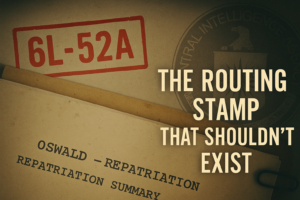Document 206-10001-10000, newly released as part of the 2025 JFK files, is just one page long.
It outlines a suspicious disappearance: a Soviet defector scheduled to leave Mexico City who seemingly never did.
The CIA flagged the irregularity.
Then they closed the file.
What does that say about how Cold War intelligence was actually handled?
📝 A Quiet Red Flag
On its surface, the memo is simple: a man was supposed to leave Mexico on October 4, 1962. The departure was never verified. The airport had no record. Immigration had no stamp. Surveillance didn’t pick him up again.
"No boarding record located. Departure date assumed but not confirmed."
But instead of triggering further investigation, the file ends with a bureaucratic shoulder shrug. The last line: "Inactive - No Action Required."
🕳️ How Many Leads Fell Through the Cracks?
It’s the kind of paper trail that raises bigger questions. If this was how defector tracking was logged in 1962, how many other reports-about defectors, agents, informants, or persons of interest-were flagged and then forgotten?
This file isn’t about one man disappearing. It’s about how the intelligence system absorbed these anomalies, stamped them as solved, and moved on.
The Soviet defector may or may not have mattered. But what matters now is the silence that followed.
📉 Intelligence Gaps, Then and Now
This memo exemplifies the Cold War dilemma of scale: too many actors, too much information, and not enough time-or will-to connect the dots.
We now know that Mexico City was a high-traffic hub for Soviet, Cuban, and U.S. intelligence. That a defector could go untracked in such a place isn’t surprising. But that he could go unfollowed, with a memo ending in passive acceptance, shows the limits of a bureaucracy under pressure.
No one sounded the alarm. No one asked if he was picked up. No one wondered whether his defection was real at all.
❌ A System That Expected to Fail
Perhaps most telling is the file’s tone: detached, procedural, and unconcerned. The very language used-"no confirmation," "departure assumed," "no further notice"-reads like a system trained to expect failure and move on.
How many of these moments existed? How many subtle gaps in records were quietly boxed and archived?
And how many were more important than anyone realized?
📂 This Time, We Noticed
The defector is long gone. But his file just surfaced. And even if it didn’t trigger alarms in 1962, it sends a different kind of signal now.
Sometimes the most important files aren’t the ones that blow the doors off history-they’re the ones that show how quietly it almost slipped past us.






